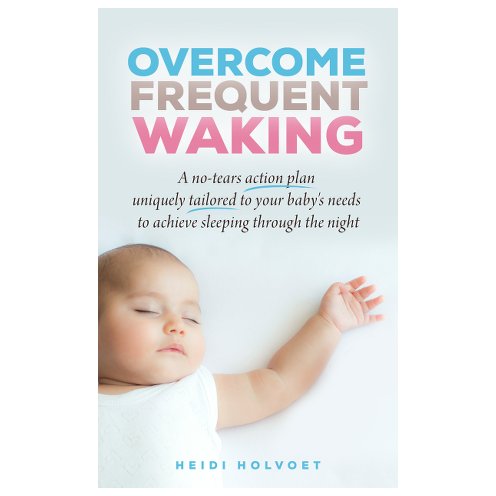What to do when your baby wakes up every hour at night
Author Name: Heidi Holvoet, PhD
The steps below help you reduce frequent wakings by remedying the underlying cause(s). It's not uncommon for a baby or toddler to wake up every hour at night or during naps.
Luckily, once you recognize the reasons why your baby wakes, recognize sleep cycles and regressions (step 1), and can remedy them (step 2); that's when improving self-soothing, napping and sleeping through the night (step 3), becomes doable with the right no-tears techniques.
🌟 I help your baby sleep better with these exact steps in my award-winning program Overcome Frequent Waking (PDF ebook + access to me in my private support group).
It gives you a tailored action plan so it's adjusted to your and your baby's unique needs and circumstances, with my proven step-by-step no-tears sleep techniques for sleeping longer stretches, weaning from feeding to sleep, self-soothing to sleep, not waking too early in the morning, napping well, and transitioning between (co)sleeping places.
Truly gently (no hidden CIO here!) yet effectively.🌟

Why Does My Baby Wake Up Every Hour?
Let's review 12 common causes of frequent night waking.
12 Reasons Why Your Baby Wakes Up Every Hour
- Restless transition from day-time to night-time
- Baby waking up due to hunger
- Baby reflux while sleeping
- Not burped enough before sleep
- Poor nap quality
- Teething
- Unable To Self Soothe
- Busy Nights
- Over-Active Body And Mind
- Physical Discomfort At Night
- Stimulating Food Or Allergies & Intolerances
- Stuck Sleep Pattern
1. Restless transition from day-time to night-time
If the transition to night-time is not calm and peaceful it can cause sleep issues. Even before you start the bedtime routine, aim for ideally around one hour of winding down time.
During that hour stick to quiet activities, keep the lights in the room low and soft, and avoid screens and electronics.
After that, your bedtime routine should be easily recognizable so that your baby will know it is time to settle down for sleep.
See the linked article for more tips on crafting a bedtime routine that supports optimal sleep habits.
2. Baby waking up due to hunger
Even when babies are old enough that feeding during the night is no longer necessary, they might still wake up feeling hungry. This could be simply due to habit, or they may be experiencing a growth spurt.
You might be able to get your baby back to sleep without feeding them, but they will likely just wake up and start crying again in an hour or so.
This problem commonly starts one of two ways: either you tried to stop night feeds by going 'cold turkey', or your baby does not feed enough during the day. It's best to reduce feeding at night over time rather than making them stop suddenly.
It can also be advised to carefully increase daytime feeds. To remain safe, a baby's nutrition, night-time and daytime feeds and sleep needs must be balanced very precisely, so use caution.
I give advice and teach methods of doing this safely, gently and effectively in my Overcome Frequent Waking program. If you are not sure what is best for your baby, don't hesitate to check with me!
3. Baby reflux while sleeping
Acid reflux (GERD) can be very painful, especially when babies are lying down for naps or to sleep at night.
Contact your doctor first for advice and to see if your baby might need medication. Even if they don't, you should still use all possible tips to prevent reflux.

In particular, it will help to burp your baby often and keep them upright for at least half an hour before putting them down to sleep. Do this for naps and at night. I do not recommend putting your baby to sleep on an incline as it's not safe.
4. Not burped enough before sleep
When feeding your baby before putting them down to sleep you need to give them enough time for burping. Not all babies burp easily.
And if your baby isn't burped well or hasn't started digestion well, she'll wake and have trouble to achieve uninterrupted sleep.
Especially if they fall asleep while feeding, aim to hold your baby upright for at least 20-30 minutes. It can help to place your baby high up on your shoulder, gently tap them on the back, or simply moving about gently.
5. Poor nap quality
Many babies who don't nap well during the day can also experience unsettled sleep patterns at night. A baby's sleep pattern will be optimal if day-time and night-time sleep are balanced over 24 hours. They might not cry, sometimes they will just be awake and not able to go back to sleep.
The ideal nap schedule depends in part on baby's age, individual situation and sleep environment. Most babies over 4 months old, and many parents, do well on fixed schedules but for some, naps don't need to be at particular times.
The key then is monitoring your baby for signs that they are getting tired and putting them down to fall asleep then.
Sleeping better during the day will improve your baby's sleep at night. In particular the very frequent night wakings will drastically reduce.
To learn more about napping, I'd like to invite you to my 3-step nap program. It's also included free as part of the more complete Overcome Frequent Waking program.
Reasons 6 to 12 of waking frequently, continued on the next page.
Appendix: Understanding your baby's hourly waking

When It's Normal For A Baby To Wake Up Every Hour
Newborn babies and babies who are about 4 months to 8 months old will wake up every few hours as part of their normal development. Their sleep cycles are designed to make this happen.
In newborn babies, it's typically due to hunger and needing to feed. In fact, frequent feedings are required for a newborn baby's safety, health and optimal growth.
After about 5-12 weeks your baby may sleep longer stretches, several hours, at night, and you might be getting used to regular sleep again.
However, we see that it is also common for babies to keep waking up after each sleep cycle, or experience a sleep regression and begin to wake up every hour after weeks or months of sleeping through the night. This can happen at ages around 5, 6 or 7 months old but for some it's more from 8, 9 or 10 months old onward.
Sleep cycles affect night wakings
This sleep regression can happen for a variety of reasons (hence the importance of a holistic approach). At this stage in their development babies' sleep cycles are shorter than in later life. Each sleep cycle has some deep sleep but they will enter a light sleep phase about 40-45 minutes to every hour at night.
During this light sleep phase it's very easy for babies to be disturbed by hunger, noise, or something else like physical or emotional discomfort and wake up completely.
Also, baby grows and goes through several developmental milestones through the first years, many of which affect night sleep. That means also older babies ages 10, 11 or 12 months old and toddlers around 15 or 18 months, or 2 or 3 years old, can suddenly start waking frequently at night.

How discomfort causes frequent night waking
Babies have sleep cycles that are around 45' to one hour long. This means that every hour at the end of the cycle your baby will experience short delicate periods of half waking up.
If anything is not ideal, they can wake up entirely and cry or otherwise need your assistance.
The sleep parenting key then to having a little one who sleeps through the night is to identify and solve the cause of waking and create the right conditions to help them fall back asleep easily.
The checklist (aboe, and next page) with 12 common reasons why your baby wakes up so often will help you identify & address potential underlying causes so that you can get back to being a well-rested parent!
What To Do About Waking Every Hour
Once your baby is beyond the newborn stage, if they still wake up every 1-2 hours there are three steps to get back to sleeping longer stretches at night again.
First, find the reason why your baby wakes during their light sleep phase. There is almost always a specific cause, and often there are several reasons. Our quick assessment higher on this page is easy to do and will help examine a first set of physical and emotional discomforts
Second, knowing exactly what's causing them, allows us to quickly resolve most and usually all discomforts well enough to improve sleep drastically and quickly and we set up the basic conditions for getting good sleep for the whole family
Third, my proven truly gentle No-Tears Sleep Techniques help with both ease of settling, quality of falling asleep and staying asleep for longer stretches
Please see my Overcome Frequent Waking program for help with these exact 3 steps, for both short-term relief and lasting improved sleep.
Article Author: Heidi Holvoet, PhD - Founder, senior sleep consultant

Heidi Holvoet, PhD, is the founder of the Baby Sleep Advice website and movement, an award-winning author, baby & toddler sleep consultant with 17+ years experience as well as a certified lactation counselor.
Over the years, Heidi has received several awards inluding a Mom's Choice Award (MCA) and National Parenting Awards (NAPPA) for her Baby Sleep Advice website, programs and books. Also, Baby Sleep Advice was awarded "Most Trusted Infant's Sleep Solutions Company 2023" in the Benelux Enterprise Awards 2023.
Heidi continually conducts personal research and participates in continued education and in that way stays up to date with current scientific and pyschosocial infant care.

She is also a member of the Association of Professional Sleep Consultants of which she was one of the earliest contributors. She obtained her PhD degree in physics at the University of Ghent in Belgium.
Heidi is passionate about helping babies and their parents sleep more and better, with her trademark holistic and truly-no-tears approach that has been proven and praised time and again by parents worldwide to be effective and truly no-tears. Respect for you as a parent and your baby, is at the heart of Heidi's warm and kind support. Her approach always keeps in mind a baby's needs and abilities at any given age, is based on pediatric science and the most up to date knowledge in infant care and sleep science.
As well as the award-winning baby sleep programs, Heidi offers popular 1:1 consults and easy-access 30-minute SOS Sleep sessions.

Overcome Frequent Waking: e-book + support
by Heidi Holvoet, PhD

A Bedtime Routine: Settling To Sleep Like A Charm
by Heidi Holvoet, PhD

Crib safety guidelines
by Heidi Holvoet, PhD

Acid reflux
by Heidi Holvoet, PhD

Why is sleep important?
by Heidi Holvoet, PhD




